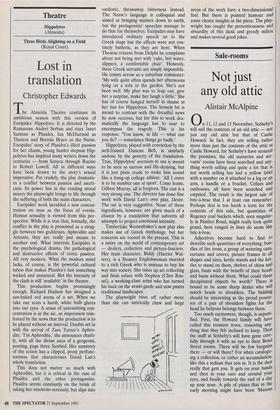Theatre Hippolytos (Almeida)
Three Birds Alighting on a Field (Royal Court)
Lost in translation
Christopher Edwards
The Almeida Theatre continues its ambitious season with this version of Euripides' Hippolytos. It is directed by the Rumanian Andrei Serban and stars Janet Suzman as Phaidra, Ian McDiarmid as Theseus and Brenda Bruce as the Nurse. Euripides' story of Phaidra's illicit passion for her chaste, young hunter stepson Hip- polytos has inspired many writers down the centuries — from Seneca through Racine to Robert Lowell. All in different ways have been drawn to the story's sexual imperative. Put crudely, the play dramatis- es a conflict between passion and asceti- cism. Its power lies in the rending moral misery the playwright brings to life through the suffering of both the main characters.
Euripides' work heralded a new concen- tration on man as the focus of events. Human sexuality is viewed from this per- spective. While it is true that, formally, the conflict in the play is presented as a strug- gle between two goddesses, Aphrodite and Artemis, they are really just means to another end. What interests Euripides is the psychological drama, the pathological and destructive effects of erotic passion. All very modern. What the modern mind lacks, of course, is the powerful cultural taboo that makes Phaidra's lust something wicked and unnatural. But the intensity of the clash is still 'available' in the theatre.
This production begins promisingly enough. Richard Hudson has designed a sun-baked red arena of a set. When we take our seats a harsh, white bulb glares into our eyes. A sense of unremitting con- centration is in the air, an impression rein- forced by the news that the production is to be played without an interval. Doubts set in with the arrival of Zara Turner's Aphro- dite. 'I'm Aphrodite,' she announces chatti- ly, with all the divine aura of a gorgeous, pouting, page three Sunbird. Her summary of the action has a clipped, prosy perfunc- toriness that characterises David Lan's whole translation.
This does not matter so much with Aphrodite, but it is critical in the case of Phaidra and the other protagonists. Phaidra seems constantly on the brink of taking her emotions seriously, but slips into sardonic, throwaway bitterness instead. The Nurse's language is colloquial and aimed at bringing matters down to earth, but the protagonists' speeches manage to do that for themselves. Euripides may have introduced ordinary speech on to the Greek stage but the effects were not rou- tinely bathetic, as they are here. When Theseus returns from Delphi he complains about not being met with 'cake, hot water, slippers, a comfortable chair'. Honestly, these Greek servants are simply impossible. He comes across as a suburban commuter: `My wife quite often spends her afternoons lying on a sofa in the garden. She's not been well. My plan was to leap out, give her a surprise, make her laugh a little.' She has of course hanged herself in shame at her lust for Hippolytos. The homely bit is meant to contrast with the dreadful news he now receives, but for this to work dra- matically the language has to soar to encompass the tragedy. This is his response: 'You know, in life — what can you do? — sometimes things go badly.'
Hippolytos, played with conviction by the well-framed Duncan Bell, is 'similarly undone by the poverty of the translation. True, Hippolytos' aversion to sex is meant to be seen as narrow and life-denying, but it is just plain crude to make him sound like a hung-up college athlete: 'All I crave is to be number one at sport'. Come home, Gilbert Murray, all is forgiven. The cast is a very strong one. The director has done fine work with David Lan's own play, Desire. The set is very suggestive. None of these ingredients, however, are given much of a chance by a translation that subverts all attempts to project emotional intensity.
Timberlake Wertenbaker's new play also makes use of Greek mythology, but her concerns are rooted in the present. This is a satire on the world of contemporary art — dealers, collectors and picture-fanciers. Her main character, Biddy (Harriet Wal- ters), is a Sloaney Englishwoman married to a rich Greek who is anxious to buy his way into society. She takes up art collecting and finds solace with Stephen (Clive Rus- sel), a working-class artist who has turned his back on the avant-garde and now paints traditional landscapes.
The playwright bites off rather more than she can satirically chew and large areas of the work have a two-dimensional feel. But there is pointed humour and some choice insights in the piece. The play- wright has caught the pretentiousness and absurdity of this dank and greedy milieu and makes several good jokes.


























































 Previous page
Previous page